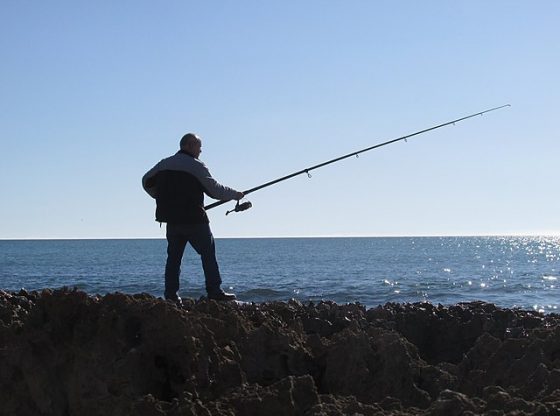The Supreme Court will consider on Wednesday two cases brought by small fishing companies seeking to prevent a federal agency from forcing them to pay the salaries of required on-board monitors, and, in doing so, overturn precedent that gives preference to agency interpretations of laws.
Based on its reading of the Magnuson-Stevens Act (MSA), the National Oceanic and Atmospheric Administration (NOAA) issued a rule requiring small fishing companies to shell out more than $700 per day to pay the salaries of federally mandated on-board observers. A pair of cases coming before the justices, Loper Bright Enterprises v. Raimondo and Relentless, Inc. v. Department of Commerce, asks the Supreme Court to do away with a decade-old legal doctrine the lower courts relied on in upholding the agency’s reading of the law: Chevron deference.
Established by a 1984 landmark Supreme Court decision, Chevron deference requires courts to defer to agency interpretations of laws when the language is ambiguous. The New Civil Liberties Alliance, representing the plaintiffs in the Relentless case, says in court filings that the legal doctrine creates “systemic bias in litigation between citizens and their government.”
“A fair trial before an impartial judge is a foundational aspect of due process,” NCLA Litigation Counsel Kara Rollins told the Daily Caller News Foundation. “But Chevron deference forces judges to be biased towards one litigant over another, and the most powerful governmental one at that. It creates systematic bias in favor of the government when the agency’s position is merely reasonable, even if it’s inferior to the private party’s or the court’s interpretation.”
The fishermen are more interested in fighting the regulation because it impacts their day-to-day operations, slashing profits by 20%, according to court documents.
In an amicus brief, the New England Fishermen’s Stewardship Association (NEFSA) notes that “removing one well-trained, well-prepared, experienced crewmember from a small, complex vessel designed to spend more than a week on the North Atlantic means that safety decreases precipitously.”
“Replacing that one person with an at sea monitor who might be fresh out of high school with all of twelve days of training spirals the risk of a catastrophe into the stratosphere,” the brief explains.
Jerry Leeman, CEO of the NEFSA, told the DCNF many monitors have no prior experience on the water. “These are generally landlocked citizens for the most part,” he said, noting some “don’t even get out of their box because they’re sick.” “We’re paying these guys more than we’re paying our own crews, and then we’re left to babysit and feed them,” Leeman told the DCNF.
His organization argues the agency “experts” did not consider these factors before issuing the rule. “None of these concerns troubled the Agency when it promulgated this final rule,” the brief explains. “Indeed, the Agency—possessed with the sort of bureaucratic, all-knowing arrogance that Chevron characteristically enables— made no mention of them in the administrative record.”
Other groups aren’t so ready to let deference to agencies go. Scientific advocacy groups, including medical and environmental groups, urged the Supreme Court in separate briefs to protect regulatory agencies’ power, warning of disruptive results if they do not.
A coalition of public health groups argued reversing Chevron would “threaten to disrupt access to care in every geographic region, at every income level and with every kind of medical care and public health need served by Medicare and Medicaid.”
In an amicus brief, Democratic senators including Sheldon Whitehouse of Rhode Island, Mazie Hirono of Hawaii, the late Dianne Feinstein of California and Elizabeth Warren of Massachusetts likewise argued that “unelected courts” should “respect career experts.”
Will Yeatman, senior legal fellow at the Pacific Legal Foundation, told the DCNF in October that agencies are frequently given deference for issues where they are not experts. “We don’t have a council of scientists who render our big decisions, and then the political branches follow suit,” Yeatman said. “That’s not the way our constitution works.”
The U.S. Chamber of Commerce wrote in an amicus brief that the lower court’s application of the Supreme Court’s 1984 Chevron decision helped “foster an unpredictable, unstable regulatory landscape defined by an ever-growing number of federal regulations.”
“The Code of Federal Regulations has ballooned from just over 110,000 pages in 1984 to more than 180,000 pages as of 2021, a 64% increase in the pages of regulations binding American companies and individuals,” the brief notes. “And the Federal Register has grown from roughly 50,000 pages in 1984 to well over 80,000 in 2022, a 60% increase.
Cause of Action Institute Executive Director James Valvo said in a statement Tuesday that the case “brings the livelihoods of family-operated fishing enterprises front and center, as their ability to fish herring is in jeopardy due to unlawful government overreach.”
“More precisely, these fishing families and businesses find themselves compelled to pay a government fee that lacks congressional authorization,” Valvo said. “This fee was imposed by the executive branch absent statutory authority, violating our Constitution’s separation of powers.”
Katelynn Richardson on January 17, 2024












